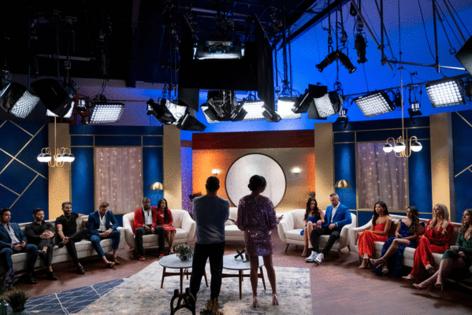Heidi Stevens: A nation hooked on 'Love Is Blind,' but divided on 'Don't Say Gay.' Make it make sense
Published in Lifestyles
I finally started watching “Love Is Blind,” the Netflix reality (I guess?) series where men and women go on a bunch of dates and get engaged without ever seeing each other.
All of their interactions, including the marriage proposal, happen in separate, windowless pods. If they agree to marry each other, they get to meet and hug and kiss and move in together. Then they walk down the aisle. Or breakup. Or walk down the aisle and break up at the altar.
It’s on its sixth season and consistently one of the most-watched shows on Netflix. And I can see why. I sat down to watch it with my daughter and her best friend one night (highly recommend watching with 18-year-olds if you have some around) and was instantly hooked. Now I’m in group texts deconstructing the generational wounds of infidelity and reading People magazine updates on past seasons and catching up on TikToks spoofing the whole premise.
It’s a lot. I regret nothing.
It is wild, though, to watch this carnival of heterosexuality play out at the same time that the “Don’t Say Gay” bill is under renewed scrutiny in Florida. A recent court settlement clarified what is and isn’t allowed in Florida classrooms, two years after the state passed a law prohibiting instruction on sexual orientation and gender identity in schools.
Under the terms of the settlement, students and teachers can discuss sexual orientation and gender identity inside their classrooms—as long as it’s not part of instruction. The Florida Board of Education will start sending memos to every school district letting them know they’re not prohibited from discussing LGBTQ people and gender identity, nor are they barred from having gay-straight alliance groups or hosting book fairs or plays with LGBTQ references or characters.
The settlement is welcome news to educators who feared losing their jobs if they displayed a family photo that included a same-sex couple. Or answered a child’s question about same-sex relationships. Or affirmed a student who drew a picture of their same-sex parents. Or hung a rainbow flag.
“What this settlement does is it re-establishes the fundamental principle, that I hope all Americans agree with, which is every kid in this country is entitled to an education at a public school where they feel safe, their dignity is respected and where their families and parents are welcomed,” Roberta Kaplan, the lead attorney for the plaintiffs, said in an interview with the Associated Press. “This shouldn’t be a controversial thing.”
But it is a controversial thing.
Gov. Ron DeSantis is calling the settlement a “major win” because it leaves the law on the books. And it still restricts what can be discussed during classroom instruction. Several other states—including Alabama, Arkansas, Indiana, Iowa, Kentucky and North Carolina—have passed similar legislation modeled after Florida's.
Thank goodness for groups like Equality Florida and the other plaintiffs for challenging the vagaries of the law, which is morally flawed and dangerous. It’s hard enough for LGBTQ youth to grow up in a society that stigmatizes them. Young people who identify as LGBTQ are already more than four times as likely to attempt suicide than their straight peers. The absolute last thing they need is legislation spelling out when it is and isn’t OK to discuss their very existence.
And the last thing same-sex adults need is a bunch of legislators sitting in judgment of their love, their lives, their families—debating the legitimacy of something as fundamental and sacred as who they love and what they’re allowed to do about it.
This isn’t about protecting the sanctity of the union between a man and a woman. This isn’t about protecting children from moral corruption. This is about human rights.
This is about carving out one kind of love and identity—the straight, cisgender kind—and setting it up as the legitimate one. The real one. The template. The ideal.
This is about taking the other kinds of love and identity and turning them into an aberration. A departure. An exception shrouded in shame to the point that we need laws to tell us when and where we can and can’t speak of them.
Meanwhile, the parade of straight people falling in and out of love or lust or look-at-me on camera continues unabated and unquestioned. No amount of reality TV—from “The Bachelor” to “Love Island” to “90 Day Fiance” to “Love Is Blind”—inspires laws codifying when and where teachers can discuss heterosexuality. No straight teachers had to breathe a sigh of relief when a court clarified that they could, indeed, display a photo from their wedding on their desk.
We have put straight marriage through the paces in this country, and the institution keeps on ticking. As it should. How a couple falls in consensual love, what they decide to do about it and how long they decide to keep at it is a mysterious, messy, beautiful, wildly individual process.
But let’s not pretend we’re protecting that process when we cloister it off through bills and bans. Let’s acknowledge those bills and bans for what they are, which is an attempt to withhold certain rights from a segment of the population, alienating and disenfranchising them as though their humanity counts a little less than the rest of ours.
And then let’s celebrate when those attempts get beaten back and slowed down, as is the case with the “Don’t Say Gay” law. And then let’s keep working to make the world a little safer and happier and healthier and more inclusive for anyone brave enough to love. It’s the only way.
©2024 Tribune News Service. Distributed by Tribune Content Agency, LLC.







Comments